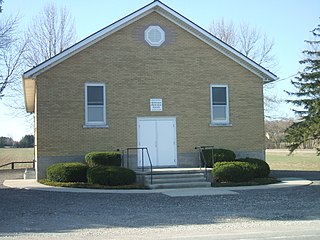Anabaptism is a Christian movement which traces its origins to the Radical Reformation in the 16th century. Anabaptists believe that baptism is valid only when candidates freely confess their faith in Christ and request to be baptized. Commonly referred to as believer's baptism, it is opposed to baptism of infants, who are not able to make a conscious decision to be baptized.

Mennonites are a group of Anabaptist Christian communities tracing their roots to the epoch of the Radical Reformation. The name Mennonites is derived from the cleric Menno Simons (1496–1561) of Friesland, part of the Holy Roman Empire, present day Netherlands. Menno Simons became a prominent leader within the wider Anabaptist movement and was a contemporary of Martin Luther (1483–1546) and Philip Melanchthon (1497–1560). Through his writings about the Reformation Simons articulated and formalized the teachings of earlier Swiss Anabaptist founders as well as early teachings of the Mennonites founded on the belief in both the mission and ministry of Jesus. Formal Mennonite beliefs were codified in the Dordrecht Confession of Faith (1632), which affirmed "the baptism of believers only, the washing of the feet as a symbol of servanthood, church discipline, the shunning of the excommunicated, the non-swearing of oaths, marriage within the same church", nonresistance, and in general, more emphasis on "true Christianity" involving "being Christian and obeying Christ" as they interpret it from the Holy Bible.

Menno Simons was a Roman Catholic priest from the Friesland region of the Low Countries who was excommunicated from the Catholic Church and became an influential Anabaptist religious leader. Simons was a contemporary of the Protestant Reformers and it is from his name that his followers became known as Mennonites.
The Church of God in Christ, Mennonite, also called Holdeman Mennonite, is a Christian Church of Anabaptist heritage. Its formation started in 1859 under its first leader, a self-described prophet named John Holdeman (1832-1900), who was a baptized Mennonite. The Church of God in Christ, Mennonite is Conservative Mennonite that has distanced itself from other Conservative Mennonites because of its one true church doctrine. In 2013 the church had 24,400 baptized members.
The Brethren in Christ Church (BIC) is a Christian denomination. Falling within the Anabaptist tradition of Christianity, the Brethren in Christ Church has roots in the Mennonite church, with influences from the revivals of Radical Pietism and the holiness movement. They have also been known as River Brethren and River Mennonites. The Canadian denomination is called Be In Christ.

The Missionary Church is an evangelical Christian denomination of Anabaptist origins with Wesleyan and Pietist influences.

The Old Order River Brethren are a River Brethren denomination of Anabaptist Christianity with roots in the Radical Pietist movement. As their name indicates, they are Old Order Anabaptists.

The Mennonite World Conference (MWC) is an international Mennonite Anabaptist Christian denomination. Its headquarters are in Kitchener, Ontario, Canada.

Mennonite Church Canada, informally known as the General Conference, is a Mennonite denomination in Canada, with head offices in Winnipeg, Manitoba. It is a member of the Mennonite World Conference and the Evangelical Fellowship of Canada.

The Mennonite Church USA is an Anabaptist Christian denomination in the United States. Although the organization is a recent 2002 merger of the Mennonite Church and the General Conference Mennonite Church, the body has roots in the Radical Reformation of the 16th century.

Anabaptist theology, also known as Anabaptist doctrine, is a theological tradition reflecting the doctrine of the Anabaptist Churches. The major branches of Anabaptist Christianity agree on core doctrines but have nuances in practice. While the adherence to doctrine is important in Anabaptist Christianity, living righteously is stressed to a greater degree.
Peace churches are Christian churches, groups or communities advocating Christian pacifism or Biblical nonresistance. The term historic peace churches refers specifically only to three church groups among pacifist churches:
Nonresistance is "the practice or principle of not resisting authority, even when it is unjustly exercised". At its core is discouragement of, even opposition to, physical resistance to an enemy. It is considered as a form of principled nonviolence or pacifism which rejects all physical violence, whether exercised on individual, group, state or international levels. Practitioners of nonresistance may refuse to retaliate against an opponent or offer any form of self-defense. Nonresistance is often associated with particular religious groups, such as Anabaptist Christianity.

John Howard Yoder was an American Mennonite theologian and ethicist best known for his defense of Christian pacifism. His most influential book was The Politics of Jesus, which was first published in 1972. Yoder was a Mennonite and wrote from an Anabaptist perspective. He spent the latter part of his career teaching at the University of Notre Dame.
The Radical Reformation represented a response to perceived corruption both in the Catholic Church and in the expanding Magisterial Protestant movement led by Martin Luther and many others. Beginning in Germany and Switzerland in the 16th century, the Radical Reformation gave birth to many radical Protestant groups throughout Europe. The term covers Radical Reformers like Thomas Müntzer and Andreas Karlstadt, the Zwickau prophets, and Anabaptist groups like the Hutterites and the Mennonites.

The Reformed Mennonite Church is a Conservative Anabaptist denomination of Christianity that officially separated from the main North American Mennonite body in 1812.
Alan Kreider was an American Mennonite historian. He was the American Professor Emeritus of Church History and Mission at the Anabaptist Mennonite Biblical Seminary in Elkhart, Indiana. His main interests were mission, worship, peace, and ecclesiastical history. Kreider continued to speak, write and publish in these areas of interest until his death in May 2017.

An ordinance is a term used by certain Christian denominations for a religious ritual that was instituted by Jesus for Christians to observe.

The Amish, formally the Old Order Amish, are a group of traditionalist Anabaptist Christian church fellowships with Swiss and Alsatian origins. As they maintain a degree of separation from surrounding populations, and hold their faith in common, the Amish have been described by certain scholars as an ethnoreligious group, combining features of an ethnicity and a Christian denomination. The Amish are closely related to Old Order Mennonites and Conservative Mennonites—denominations that are also a part of Anabaptist Christianity. The Amish are known for simple living, plain dress, Christian pacifism, and slowness to adopt many conveniences of modern technology, with a view neither to interrupt family time, nor replace face-to-face conversations whenever possible, and a view to maintain self-sufficiency. The Amish value rural life, manual labor, humility and Gelassenheit.